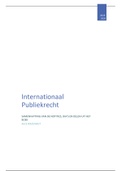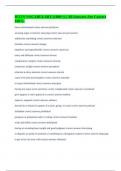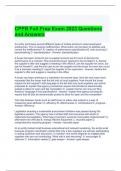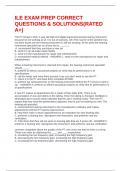P1: Equality, diversity and discrimination
Equality is ensuring that each individual has equal opportunities to make the most of
their lives. Diversity is understanding that not everyone is the same and that each
individual is unique. They are then put into characteristics under the Equality act 2010.
✅ P1 Discrimination is the treatment of people which is unfair and unjust towards
different groups such as gender, race and sexual orientation. (1. class notes). There are
3 types of discrimination: direct, indirect and positive. Direct discrimination✅ P1 is when
they purposely treated differently for their religion. Indirect discrimination is when they
accidently discriminate. Positive✅ P1 is when they treat them differently when in a
positive way. Brenda got abused by a male relative in her youth so she has expressed
she doesn't want a male GP but there were no female nurses which is indirect
discrimination due to lack of resources. Maria’s mum is at risk of discrimination due to
her dementia as the health care workers can loose their patience with maria which
would be an example of direct discrimination.✅ P1
Preventing Discrimination
To prevent discrimination there are many things that can be put in place such as an
advocate, support, acsess, and cultural decisions to support and prevent indivuals. An
advocate is someone who is able to speak on your behalf and is able to support you.
Some types of support can be mental or physical such as therapy.✅ P1 Furthermore,
some cases such as ramps for wheelchair users, leaflets for people who may have
language barriers or are deaf/hard of hearing and braille can be put in place for the
blind. For Brenda she has requested an advocate at all of her revisions of her care plan
which prevents discrimination if she believes she is unable to get all her points of
concern across in the revsion care plan and will also create less stress for brenda. To
prevent discrimination for Maria’s mother they could provide some pictures of what she
requires so the nurses are able to understand what she wants and when she would like
it. (1.class notes)✅ P1
M1: Impact of preventing discrimination
The first case study is Brenda and the positive impacts of her having an advocate as
previously mentioned is that they will respect Brenda's decisions and boundaries
regarding information and will be able to let Brenda have less stress and anxiety
however, Maria hasn't been allowed an advocate to attend all of her revision care plan
as it is an inappropriate use of resources which could make Brenda feel frustrated and
angry which could lead her to feel stressed and then could isolate her and make her feel
more depressed and will not allow her to socially function.✅ P1 1M She has also been
offered a health visitor so it helps her independence as she would be healthier and is
able to overcome her challenges and problems by herself without needing any help.
Moreover, if Brenda doesn't get a health visitor then she may have undiagnosed health
issues which could create bigger health issues such as having undiagnosed lung
,problems which would make her asthma worse. ✅ P1 1M An asthma specialist has
been given to Brenda which would help her as she can be able to identify triggers of the
asthma. They can also diagnose and treat any conditions which can be making the
asthma symptoms harder to manage so Brenda would benefit from this and not
develop anymore respiratory problems. Furthermore, if Brenda doesn't have this asthma
specialist coming to see her once a month then it could make it harder for her to
breathe and she could have a severe asthma attack which could be life threatening. (2.
asthma- august 2019) ✅ P1 1M
The second case study is Maria and she has been assigned a social worker ✅ P1 1M
which has helped both Maria and Mrs Montanelli by advising Mrs Montanelli to go into a
care home which would support Maria so she will be able to keep her job and provide an
income while her mother is being cared for so she doesn't need to worry about her
however, the social worker could make could Make Maria worried as she doesnt want
her mum to go into a home which would cause Maria to become more anxious and
stressed as she can't accept that she cannot care for her mother.✅ P1 1M The next
factor is that a volunteer interpreter has been arranged for sessions where decisions
are made which can empower Mrs Montanelli as she is able to make decisions for
herself and no one else is making her decisions for her.✅ P1 1M It can also allow her
to have choices and opportunities to express where she wants to go such as a care
home. On the other hand, without the volunteer interpreter Mrs Monrtanelli wouldn't be
able to make her own decisions and not understand what they are talking about so may
become frustrated and angry at the social services as they are discriminating her
against her language barrier. This may lead her to refuse or ignore anything they say so
she becomes socially isolated from the professionals which would deteriorate her
mental and physical health.✅ 1M The last factor would be that Maria has been given
compassionate leave to help her mother and sort out the arrangements as she has been
advised to put her mum into a care home and the leave will allow her to not have any
added stress from teaching as she will be need to be there for long hours which takes
her away from caring for her mum however, if Maria wasn't given compassionate leave
then her anxiety and mental health would deteriorate as she is stressed from work and
caring for her mum which would also mean she will have no time for herself and would
be neglecting her own care.✅ P1 M1 met
D1: Success of promoting anti-discriminatory pratices
The first case study is brenda and she has had some success to some extent with
preventing discrimination but there could be more done. The first factor is that due to
the lack of funding and resources✅ D1 Brenda is unable to have a female psychiatrist
which would make Brenda feel unsafe and possibly scared to be left alone with a male
due to her abuse when she was in her youth. This has then impacted the way she feels
around men, without this female psychiatrist she may not want to go to the health
centre when she needs to go get treatment or a diagnosis such as having a diagnosis
for depression and medication like SSRI which would then lead Brenda to a greater
, depression and she may have suicidal thoughts as she wouldnt go and get treated by a
male. Another factor that hasnt promoted anti-discriminatory is the use of the advocate
as it was deemed an inappropiate use of resources which could anger Brenda as she
may feel like she cannot express her views by herself and needs an advocate at all
sessions for her to feel empowered. ✅ D1This could then impact Brenda by making her
anxious if she feels like her views and opinions are not going to be expressed and the
concerns she has regarding her plan will be ignored.✅ D1 Moreover, there has been
practices put in place to promote ant-discriminatory behaviour towards brenda such as
a named person in the community who will safeguard Brenda when she is there which
will allow her to feel respected and safer as she will feel comfortable knowing that
nothing is going to happen to her and she is protected if something starts to go wrong.
✅ D1 They will also know that she would be sensitive around certain topics so they
could all avoid them. Another practice that has been put in place is that she has been
assured of her confidentiality and kept her wishes from her information to be shared
with people that absolutely need it in order to help Brenda's care. Furthermore, i think
there could be more done to support Brenda✅ D1 such as having a female psychiatrist
and if there is a lack of women they should refer Brenda over to a new clinic so she
feels safe and secure so that she does go and get treated if she isn't feeling well
instead of just leaving it and her condition possibly getting worse. If she isn't able to get
to the new clinic they should provide transport for Brenda as there is a lack of resources
on their behalf and it will not be Brenda's fault. I also think Brenda should have the
advocate at all sessions because then she will feel empowered and that would boost
her self esteem and mental health which would allow her to express her concerns about
her own care plan and moving forward. (1.class notes)✅ D1
The second case study is Maria and Mrs Montanelli which I think there has also been
some success to some extent of preventing discrimination. Firstly, Maria has been
offered a night sitter but only for one night a week which can be frustrating for Maria as
she cannot get more than one full night sleep a week which would then impact her
teaching as she may be irritable with the children so cannot teach properly. Maria has
been refused a night sitter for more than once a week because of the language barrier
between Mrs Montanelli and the night sitters which can also be frustrating on Maria as
Mrs Montanelli is being discriminated ✅ D1for her language barrier and her dementia as
she was able to speak English until her dementia had made her lose the memory of
English. Another factor is that Mrs Motanelli couldn't have a bilingual care assistant due
to the lack of funding which can be upsetting and annoying for Maria as she will have to
translate for Mrs Montanelli otherwise she will have no empowerment due to the fact
she is unable to understand what her care plan will be so she may feel frustrated ✅
D1and may be upset with the healthcare workers as they aren't able to support Mrs
Montanelli. On the other hand, healthcare professionals have put in place for a volunteer
interpreter which will attend all sessions which will then allow Mrs Montanelli to be a
part of her own care plan which could help her feel less frustrated and upset with the
healthcare professionals. They have also given Maria compassionate leave which
would allow her to help her mum and sort out her anxiety medication so she doesn't feel
Equality is ensuring that each individual has equal opportunities to make the most of
their lives. Diversity is understanding that not everyone is the same and that each
individual is unique. They are then put into characteristics under the Equality act 2010.
✅ P1 Discrimination is the treatment of people which is unfair and unjust towards
different groups such as gender, race and sexual orientation. (1. class notes). There are
3 types of discrimination: direct, indirect and positive. Direct discrimination✅ P1 is when
they purposely treated differently for their religion. Indirect discrimination is when they
accidently discriminate. Positive✅ P1 is when they treat them differently when in a
positive way. Brenda got abused by a male relative in her youth so she has expressed
she doesn't want a male GP but there were no female nurses which is indirect
discrimination due to lack of resources. Maria’s mum is at risk of discrimination due to
her dementia as the health care workers can loose their patience with maria which
would be an example of direct discrimination.✅ P1
Preventing Discrimination
To prevent discrimination there are many things that can be put in place such as an
advocate, support, acsess, and cultural decisions to support and prevent indivuals. An
advocate is someone who is able to speak on your behalf and is able to support you.
Some types of support can be mental or physical such as therapy.✅ P1 Furthermore,
some cases such as ramps for wheelchair users, leaflets for people who may have
language barriers or are deaf/hard of hearing and braille can be put in place for the
blind. For Brenda she has requested an advocate at all of her revisions of her care plan
which prevents discrimination if she believes she is unable to get all her points of
concern across in the revsion care plan and will also create less stress for brenda. To
prevent discrimination for Maria’s mother they could provide some pictures of what she
requires so the nurses are able to understand what she wants and when she would like
it. (1.class notes)✅ P1
M1: Impact of preventing discrimination
The first case study is Brenda and the positive impacts of her having an advocate as
previously mentioned is that they will respect Brenda's decisions and boundaries
regarding information and will be able to let Brenda have less stress and anxiety
however, Maria hasn't been allowed an advocate to attend all of her revision care plan
as it is an inappropriate use of resources which could make Brenda feel frustrated and
angry which could lead her to feel stressed and then could isolate her and make her feel
more depressed and will not allow her to socially function.✅ P1 1M She has also been
offered a health visitor so it helps her independence as she would be healthier and is
able to overcome her challenges and problems by herself without needing any help.
Moreover, if Brenda doesn't get a health visitor then she may have undiagnosed health
issues which could create bigger health issues such as having undiagnosed lung
,problems which would make her asthma worse. ✅ P1 1M An asthma specialist has
been given to Brenda which would help her as she can be able to identify triggers of the
asthma. They can also diagnose and treat any conditions which can be making the
asthma symptoms harder to manage so Brenda would benefit from this and not
develop anymore respiratory problems. Furthermore, if Brenda doesn't have this asthma
specialist coming to see her once a month then it could make it harder for her to
breathe and she could have a severe asthma attack which could be life threatening. (2.
asthma- august 2019) ✅ P1 1M
The second case study is Maria and she has been assigned a social worker ✅ P1 1M
which has helped both Maria and Mrs Montanelli by advising Mrs Montanelli to go into a
care home which would support Maria so she will be able to keep her job and provide an
income while her mother is being cared for so she doesn't need to worry about her
however, the social worker could make could Make Maria worried as she doesnt want
her mum to go into a home which would cause Maria to become more anxious and
stressed as she can't accept that she cannot care for her mother.✅ P1 1M The next
factor is that a volunteer interpreter has been arranged for sessions where decisions
are made which can empower Mrs Montanelli as she is able to make decisions for
herself and no one else is making her decisions for her.✅ P1 1M It can also allow her
to have choices and opportunities to express where she wants to go such as a care
home. On the other hand, without the volunteer interpreter Mrs Monrtanelli wouldn't be
able to make her own decisions and not understand what they are talking about so may
become frustrated and angry at the social services as they are discriminating her
against her language barrier. This may lead her to refuse or ignore anything they say so
she becomes socially isolated from the professionals which would deteriorate her
mental and physical health.✅ 1M The last factor would be that Maria has been given
compassionate leave to help her mother and sort out the arrangements as she has been
advised to put her mum into a care home and the leave will allow her to not have any
added stress from teaching as she will be need to be there for long hours which takes
her away from caring for her mum however, if Maria wasn't given compassionate leave
then her anxiety and mental health would deteriorate as she is stressed from work and
caring for her mum which would also mean she will have no time for herself and would
be neglecting her own care.✅ P1 M1 met
D1: Success of promoting anti-discriminatory pratices
The first case study is brenda and she has had some success to some extent with
preventing discrimination but there could be more done. The first factor is that due to
the lack of funding and resources✅ D1 Brenda is unable to have a female psychiatrist
which would make Brenda feel unsafe and possibly scared to be left alone with a male
due to her abuse when she was in her youth. This has then impacted the way she feels
around men, without this female psychiatrist she may not want to go to the health
centre when she needs to go get treatment or a diagnosis such as having a diagnosis
for depression and medication like SSRI which would then lead Brenda to a greater
, depression and she may have suicidal thoughts as she wouldnt go and get treated by a
male. Another factor that hasnt promoted anti-discriminatory is the use of the advocate
as it was deemed an inappropiate use of resources which could anger Brenda as she
may feel like she cannot express her views by herself and needs an advocate at all
sessions for her to feel empowered. ✅ D1This could then impact Brenda by making her
anxious if she feels like her views and opinions are not going to be expressed and the
concerns she has regarding her plan will be ignored.✅ D1 Moreover, there has been
practices put in place to promote ant-discriminatory behaviour towards brenda such as
a named person in the community who will safeguard Brenda when she is there which
will allow her to feel respected and safer as she will feel comfortable knowing that
nothing is going to happen to her and she is protected if something starts to go wrong.
✅ D1 They will also know that she would be sensitive around certain topics so they
could all avoid them. Another practice that has been put in place is that she has been
assured of her confidentiality and kept her wishes from her information to be shared
with people that absolutely need it in order to help Brenda's care. Furthermore, i think
there could be more done to support Brenda✅ D1 such as having a female psychiatrist
and if there is a lack of women they should refer Brenda over to a new clinic so she
feels safe and secure so that she does go and get treated if she isn't feeling well
instead of just leaving it and her condition possibly getting worse. If she isn't able to get
to the new clinic they should provide transport for Brenda as there is a lack of resources
on their behalf and it will not be Brenda's fault. I also think Brenda should have the
advocate at all sessions because then she will feel empowered and that would boost
her self esteem and mental health which would allow her to express her concerns about
her own care plan and moving forward. (1.class notes)✅ D1
The second case study is Maria and Mrs Montanelli which I think there has also been
some success to some extent of preventing discrimination. Firstly, Maria has been
offered a night sitter but only for one night a week which can be frustrating for Maria as
she cannot get more than one full night sleep a week which would then impact her
teaching as she may be irritable with the children so cannot teach properly. Maria has
been refused a night sitter for more than once a week because of the language barrier
between Mrs Montanelli and the night sitters which can also be frustrating on Maria as
Mrs Montanelli is being discriminated ✅ D1for her language barrier and her dementia as
she was able to speak English until her dementia had made her lose the memory of
English. Another factor is that Mrs Motanelli couldn't have a bilingual care assistant due
to the lack of funding which can be upsetting and annoying for Maria as she will have to
translate for Mrs Montanelli otherwise she will have no empowerment due to the fact
she is unable to understand what her care plan will be so she may feel frustrated ✅
D1and may be upset with the healthcare workers as they aren't able to support Mrs
Montanelli. On the other hand, healthcare professionals have put in place for a volunteer
interpreter which will attend all sessions which will then allow Mrs Montanelli to be a
part of her own care plan which could help her feel less frustrated and upset with the
healthcare professionals. They have also given Maria compassionate leave which
would allow her to help her mum and sort out her anxiety medication so she doesn't feel










